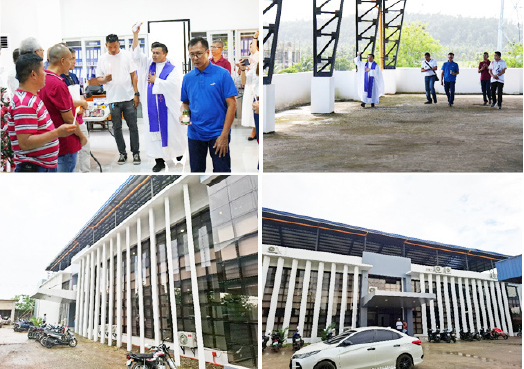
(PROVINCIAL GOVERNMENT OF NORTHERN SAMAR FACEBOOK)
TACLOBAN CITY– Northern Samar is entering 2026 on the back of a year marked by strong governance, sustainable development, and people-centered programs, the Provincial Information Office reported.
In 2025, under the leadership of then-Governor Edwin Ongchuan and continued by Governor Harris Ongchuan, the province strengthened institutions, improved public services, and promoted initiatives that reached every Nortehanon.
These efforts earned Northern Samar recognition as the Seal of Good Local Governance Regional Champion by the Department of the Interior and Local Government, alongside 14 component municipalities.
The province also made strides in investment promotion and renewable energy.
Northern Samar received the Gawad Bayanihan sa Pamumuhunan Award, a Presidential Award, for effectively implementing “Green Lanes” through the Provincial Economic Development and Investment Promotions Office. The policy accelerated investment opportunities while ensuring transparency and efficiency.
In a national first, the province institutionalized a Green Lane Policy for renewable energy, earning the National Champion award at the Sustainable Energy Awards 2025 from the Department of Energy. This was complemented by the enactment of the Corporate Social Responsibility Ordinance of 2025, linking development with tangible community benefits.
Fiscal discipline remained a priority, with the province recognized as the 2025 Seal of Local Public Financial Management Excellence Award winner—the only province in Eastern Visayas to receive the honor. Strong financial management across seven pillars reflected transparent budgeting, accountable spending, and active citizen engagement.
Northern Samar’s dedication to service excellence extended to employment and social programs. The Public Employment Service Office was named Best PESO in Region VIII, while the Provincial Population Office secured Second Place in the 2025 Rafael M. Salas Kaunlaran Pantao Award, highlighting evidence-based family and community programs.
Health services were likewise recognized, with the Northern Samar Provincial Hospital cited for green and safe health facilities, and the Provincial Health Office earning multiple awards for nutrition and health program implementation.
The province’s commitment to evidence-based governance was further validated through the 2025 CBMS Gawad Galing Lokal, where it received both the Outstanding LGU Award and the People’s Choice Award for effective use of community-level data.
Accountability in development was reinforced as Northern Samar was recognized as the Top Performing Provincial Project Monitoring Committee in Region VIII, alongside honors in financial management excellence and compliance.
Cultural and environmental milestones capped the year. The Biri Rock Formations were declared a National Geological Monument and recognized as one of the country’s Natural Wonders, ensuring the preservation of a site of exceptional scientific and natural value.
The Provincial Tourism Office also won grand winner for Best Practices in Community-Based Tourism, reflecting a model of sustainable tourism that benefits local communities while protecting the environment.
The Provincial Information Office noted that these achievements stem from steady leadership and a professional workforce committed to translating policies into progress.
As Northern Samar moves forward in 2026, these milestones serve as a foundation for continued good governance, inclusive growth, and responsive public service for every Nortehanon.
(JOEY A. GABIETA)



Navigating the moral maze: Ethical considerations for entrepreneurs
Entrepreneurship is often celebrated for its innovation, risk-taking, and wealth creation. However, the pursuit of success can present entrepreneurs with a complex web of ethical dilemmas. Making the right choices is crucial, not only for maintaining a positive reputation but also for building a sustainable and responsible business that contributes to society.
1. Honesty and Transparency: Building Trust
Honesty and transparency are the cornerstones of ethical business practices. Entrepreneurs must be truthful in their marketing, sales, and communication with customers, employees, investors, and other stakeholders.
Ethical Considerations:
• Accurate Advertising: Avoiding deceptive or misleading advertising claims.
• Transparent Pricing: Clearly disclosing all costs and fees to customers.
• Honest Communication: Being truthful in all communications with stakeholders.
• Data Privacy: Protecting customer data and being transparent about data collection practices.
2. Fair Competition: Playing by the Rules
Entrepreneurs must compete fairly and avoid engaging in unethical or illegal practices to gain a competitive advantage.
Ethical Considerations:
• Avoiding Anti-Competitive Practices: Refraining from price-fixing, bid-rigging, and other anti-competitive behaviors.
• Respecting Intellectual Property: Protecting their own intellectual property and respecting the intellectual property rights of others.
• Avoiding False Advertising: Refraining from making false or misleading claims about competitors.
• Fair Hiring Practices: Avoiding discriminatory hiring practices and treating all candidates fairly.
3. Employee Relations: Valuing Human Capital
Ethical entrepreneurs recognize that their employees are their most valuable asset and treat them with respect and fairness.
Ethical Considerations:
• Fair Wages and Benefits: Paying employees fair wages and providing adequate benefits.
• Safe Working Conditions: Providing a safe and healthy work environment.
• Equal Opportunity: Providing equal opportunities for all employees, regardless of their race, gender, religion, or other protected characteristics.
• Respectful Treatment: Treating all employees with respect and dignity.
• Work-Life Balance: Promoting a healthy work-life balance for employees.
4. Environmental Responsibility: Protecting the Planet
Ethical entrepreneurs are mindful of the environmental impact of their businesses and take steps to minimize their footprint.
Ethical Considerations:
• Sustainable Practices: Adopting sustainable business practices, such as reducing waste, conserving energy, and using renewable resources.
• Environmental Compliance: Complying with all environmental regulations.
• Responsible Sourcing: Sourcing materials and products from suppliers who adhere to ethical and environmental standards.
• Product Lifecycle Management: Considering the environmental impact of products throughout their lifecycle, from design to disposal.
5. Social Responsibility: Giving Back to the Community
Ethical entrepreneurs recognize their responsibility to contribute to the well-being of the communities in which they operate.
Ethical Considerations:
• Community Involvement: Supporting local charities and community organizations.
• Ethical Sourcing: Sourcing products and materials from ethical and sustainable suppliers.
• Philanthropy: Donating a portion of profits to charitable causes.
• Creating Social Impact: Developing products or services that address social or environmental problems.
6. Conflicts of Interest: Maintaining Objectivity
Entrepreneurs must avoid conflicts of interest that could compromise their objectivity and decision-making.
Ethical Considerations:
• Disclosure: Disclosing any potential conflicts of interest to stakeholders.
• Avoiding Self-Dealing: Refraining from using their position for personal gain.
• Objectivity: Making decisions that are in the best interests of the company, rather than their own personal interests.
7. Investor Relations: Building Trust and Confidence
Ethical entrepreneurs treat their investors with honesty and respect, providing them with accurate information and managing their investments responsibly.
Ethical Considerations:
• Accurate Financial Reporting: Providing investors with accurate and transparent financial reports.
• Responsible Use of Funds: Using investor funds responsibly and in accordance with the agreed-upon terms.
• Open Communication: Maintaining open communication with investors and keeping them informed of the company’s progress.
8. Supply Chain Ethics: Ensuring Fair Labor Practices
Ethical entrepreneurs are responsible for ensuring that their supply chains adhere to ethical labor practices.
Ethical Considerations:
• Fair Wages and Working Conditions: Ensuring that workers in their supply chains are paid fair wages and work in safe and healthy conditions.
• Child Labor: Prohibiting the use of child labor in their supply chains.
• Forced Labor: Prohibiting the use of forced labor in their supply chains.
• Transparency: Being transparent about their supply chain practices and working to improve ethical standards.
Conclusion
Entrepreneurs face a multitude of ethical considerations in their pursuit of success. By prioritizing honesty, fairness, responsibility, and transparency, entrepreneurs can build sustainable and responsible businesses that contribute to society and create lasting value. Ethical decision-making is not just good for society; it’s also good for business. A strong ethical reputation can attract customers, employees, investors, and other stakeholders, leading to long-term success and sustainability.
————–
If you have any questions or would like to share your thoughts on the column, feel free to send an email to jca.bblueprint@gmail.com. Looking forward to connecting with you!